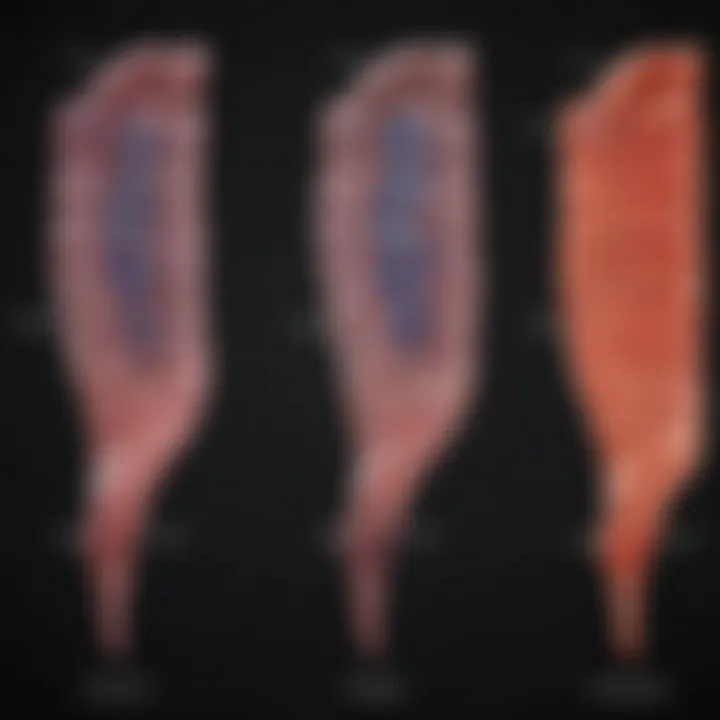Understanding Mucinous Colon Cancer: Key Insights


Intro
Mucinous colon cancer is not just a mere variation of colorectal carcinoma; it offers a distinct challenge in the realm of diagnosis, treatment, and prognosis. With its characteristic mucin production, it often raises eyebrows and prompts inquiry among healthcare professionals and researchers alike. This article seeks to illuminate the particularities associated with this cancer subtype, presenting a thorough examination of its biological implications, treatment choices, and the future of research in this lesser-known domain.
The significance of understanding mucinous colon cancer cannot be overstated. Given that it contributes notably to colorectal cancer cases, dissecting its unique features is crucial for developing targeted treatment strategies. Those who delve into this topic will find insights not just relevant but essential in advancing patient care. The complexity of its pathophysiology intertwines with various treatment modalities, often leaving practitioners at a crossroads regarding effective management approaches.
At the core of this exploration lies a commitment to detail, ensuring that nuance and context are provided for each aspect of mucinous colon cancer. As we uncover the layers of this medical conundrum, the aim is to bridge gaps in knowledge and foster an environment for future research endeavors that can lead to improved patient outcomes.
Moving deeper into this discussion, the first section provides an examination of the methodologies used to investigate mucinous colon cancer, a crucial foundation to build upon as we venture into clinical implications.
Foreword to Mucinous Colon Cancer
Mucinous colon cancer, though a relatively less common variant of colorectal cancer, warrants significant attention due to its unique histological characteristics and its distinct clinical behavior. Recognizing its nuances not only aids in diagnosis but also informs therapeutic approaches, making it a critical subject in the landscape of gastrointestinal oncology.
Definition and Characteristics
Mucinous colon cancer is defined primarily by its histological feature of containing a high percentage of mucin—a gel-like substance produced by cells that serve as a protective barrier and lubricant. In this subtype, more than 50% of the tumor's composition is made up of mucin, distinguishing it from more conventional forms of colon cancer. This extensive presence of mucin can lead to differences in tumor morphology and behavior.
Clinically, mucinous colon cancer may manifest with symptoms that are similar to typical colorectal cancers, such as changes in bowel habits, abdominal pain, or weight loss. However, the abundant mucin content may influence how the cancer progresses and even its responsiveness to certain treatment modalities. Understanding these characteristics is essential not just for healthcare providers diagnosing the condition, but also for researchers unraveling the molecular intricacies at play.
Epidemiology and Incidence Rates
In terms of epidemiology, mucinous colon cancer represents around 10-15% of all colorectal cancers, a figure that underscores its relevance within the broader classification of colorectal malignancies. Its incidence can be influenced by various factors, including age, gender, and even geographic location.
Research indicates that this subtype tends to appear more frequently in younger patients compared to non-mucinous variants. Furthermore, certain genetic predispositions seem to co-occur with mucinous forms. For instance, individuals with hereditary nonpolyposis colorectal cancer (HNPCC) may have a heightened risk of developing mucinous tumors.
"Studying mucinous colon cancer helps shine a light on the importance of histopathological examination in colorectal malignancies, which can often lead to more tailored and effective treatment routes."
The understanding of mucinous colon cancer extends beyond mere numbers; it invites discourse on its management and the implications of its distinct pathology. As we delve deeper into the layers of this disease, the importance of nuanced recognition of its features becomes ever clearer.
Pathophysiology of Mucinous Colon Cancer
Understanding the pathophysiology of mucinous colon cancer is crucial. This specialized cancer subtype poses unique challenges due to its distinctive nature. It’s important to dissect the histological features, molecular changes, and particularly the role of mucin itself in shaping tumor characteristics. Armed with this knowledge, clinicians and researchers can better approach diagnosis, treatment options, and patient outcomes.
Histological Features
Mucinous colon cancer is marked by certain histological traits which set it apart from more common variants of colon cancer. Pathologists often observe a substantial amount of mucin, which is a gel-like substance produced by mucous cells. This mucin accounts for more than 50% of the tumor’s volume in many cases. In microscopic evaluations, these tumors display a peculiar architecture, often exhibiting poorly differentiated regions that challenge effective treatment.
- The presence of signet-ring cells may also be noted, which are characterized by their distinct morphology and can signal more aggressive disease.
- Additionally, the stromal reaction which often accompanies the tumor is unique, with significant changes in the surrounding tissue accommodating high levels of mucin production.
These histopathological indicators contribute to the distinctive natural history and treatment response profile for mucinous colon cancer, warranting dedicated focus during assessment and management.
Molecular Changes
On a molecular level, mucinous colon cancer shows several alterations that diverge from typical adenocarcinomas. Genetic mutations are pivotal players in the mold of this cancer, influencing how it behaves and how patients respond to treatments.
Among the key changes, mutations in the KRAS gene stand out. They predispose patients to more aggressive forms of the disease and poorer overall prognoses. Beyond KRAS, mutations in genes such as PIK3CA and TP53 could also arise, further complicating the landscape of this subtype.
- The microsatellite instability (MSI) status can also vary, with some mucinous tumors exhibiting high MSI. This condition can influence treatment decisions, especially regarding the use of immunotherapies.
- Furthermore, the expression of certain biomarkers related to mucin, such as MUC2, can also indicate tumor aggressiveness and potential for metastasis.
Role of Mucin in Tumor Biology
Mucin isn't just a passive byproduct; it's a key player in the biology of mucinous colon cancer. Its unique composition and role contribute to both tumor progression and treatment outcomes.
The abundant mucin creates a special tumor microenvironment that can:
- Protect tumor cells from the host immune system, allowing them to evade detection and destruction.
- Help tumors achieve enhanced mobility, thus increasing the likelihood of metastasis.
In some contexts, mucin may even confer a chemoresistant phenotype on cancer cells, rendering traditional chemotherapy less effective. The tumor cells’ dependency on high mucin levels could also mean that therapies targeting mucin production or activity may present a compelling avenue for future treatment options.
Mucinous colon cancer truly represents a unique challenge not only due to its histological and molecular features but also because of the role mucin plays in shaping its biology and response to therapies.
In synthesizing all these facets of mucinous colon cancer, it becomes evident that this subtype requires a specialized approach to research and treatment, emphasizing the significance of comprehensively understanding its pathophysiology.
Diagnostic Approaches
The realm of diagnostic approaches for mucinous colon cancer holds immense significance in the early identification of this specific subtype of colorectal carcinoma. Given the distinctive histological features associated with mucinous colon cancer, effective diagnosis is paramount in tailoring treatment strategies that can significantly influence patient outcomes. A comprehensive understanding of various diagnostic modalities can empower healthcare professionals to make informed decisions, ultimately improving patient care.
Imaging Techniques
Imaging techniques serve as frontline tools in the diagnostic arsenal for mucinous colon cancer. While traditional methods such as X-rays have their place, computed tomography (CT) scans and magnetic resonance imaging (MRI) are pivotal in providing detailed insights into the tumor's location, size, and potential metastasis. These modalities enhance visualization and help to classify the tumor more accurately.
For instance, CT colonography or virtual colonoscopy can reveal abnormalities of the colonic wall, while MRI is particularly useful in assessing rectal cancers, where the anatomical intricacies must be meticulously evaluated.
- Benefits of Imaging Techniques:
- Non-invasive nature allows for thorough examination
- Enhanced detection of metastases in liver or lymph nodes
- Facilitates staging of the cancer, crucial for treatment planning
In the context of mucinous colon cancer, identifying the degree of mucin production through imaging can also assist clinicians in predicting the potential aggressiveness of the disease. The integration of these technologies can better equip oncologists to develop personalized treatment plans, spotlighting their importance in the diagnostic landscape.


Biopsy and Histopathological Evaluation
Once imaging raises suspicion of mucinous colon cancer, a biopsy becomes essential. This step allows tissue samples to be evaluated histopathologically, confirming the diagnosis and revealing critical details about the tumor's characteristics.
The process usually involves either a colonoscopy-guided biopsy or, when necessary, surgical intervention. Microscopic examination then highlights the unique features of mucinous colon cancer, such as the bulky tumor's appearance filled with mucin, differing from more common adenocarcinomas.
- Key Points in Biopsy Evaluation:
- Determining the percentage of mucin in tumor cells
- Identifying atypical cells which indicate malignancy
- Assessing tumor differentiation, aiding in prognosis
Histopathological analysis is not merely a formality but the gateway to understanding how mucinous colon cancer behaves. This informs subsequent treatment decisions and might identify relevant biomarkers indicative of potential treatment responses, further accentuating its significance.
Molecular Diagnostics
Molecular diagnostics takes a deeper dive into the genetic and molecular landscape of mucinous colon cancer. This approach leverages techniques such as next-generation sequencing (NGS) and polymerase chain reaction (PCR) to unravel the genetic mutations and molecular pathways involved in tumorigenesis.
Such investigations can reveal alterations in genes like KRAS and BRAF, which are profoundly influential in guiding therapeutic strategies, particularly concerning targeted therapies. Notably, the microsatellite instability (MSI) status also merits attention, especially in the context of immunotherapy effectiveness.
- Significance of Molecular Diagnostics:
- Identifies potential targets for tailored therapies
- Helps predict responses to specific treatments
- Informs discussions around clinical trial opportunities for patients
Clinical Manifestations
Understanding clinical manifestations of mucinous colon cancer is essential for several reasons. One of the primary aspects lies in recognizing the specific symptoms that are commonly associated with this subtype. Early detection is often the key to improving outcomes, but identifying these symptoms can sometimes prove tricky, given their overlap with other gastrointestinal disorders. Moreover, the manifestations may vary significantly from patient to patient, making personalized assessment crucial.
In addition, clinical symptoms can serve as indicators for disease progression. Knowledge about how symptoms evolve can guide healthcare providers in tailoring management strategies that suit individual patient needs better. Without a firm grasp on these manifestations, treatment may be misaligned, compromising efficacy.
Common Symptoms
Mucinous colon cancer presents a set of symptoms that can often be misattributed to benign gastrointestinal disturbances. Below are some of the most prevalent symptoms observed in patients:
- Abdominal Pain: Often localized yet can present as generalized discomfort, abdominal pain is one of the first signs.
- Changes in Bowel Habits: Patients may experience alternating constipation and diarrhea, which could raise red flags.
- Unintentional Weight Loss: Patients may also exhibit significant weight loss without any intention of dieting or exercise.
- Fatigue: A common complaint among those battling various cancers, fatigue can deeply affect quality of life.
- Rectal Bleeding or Blood in Stool: While alarming, this symptom can be mistakenly attributed to hemorrhoids or other conditions.
It is critical for both patients and clinicians to recognize these red flags. They reflect a potential underlying pathology that may require immediate medical intervention. Collectively, these symptoms can indicate a decline in the patient’s overall health, warranting thorough evaluation.
Staging of Disease
Staging of mucinous colon cancer is vital for determining the most effective treatment strategy and predicting outcomes. The tumor’s stage influences everything from surgical options to considerations for chemotherapy. Stages range from localized disease where the tumor is confined to the colon to advanced stages with distant metastases.
- Stage 0 (Carcinoma in situ): Cancer is confined to the mucosa.
- Stage I: Tumor penetrates through the mucosa into the submucosa.
- Stage II: Tumor invades through the full thickness of the colon wall.
- Stage III: Cancer has spread to nearby lymph nodes.
- Stage IV: Distant spread, affecting organs like the liver or lungs.
Assessment is not just a numbers game; it involves imaging tests such as CT scans or MRIs, along with colonoscopies to ascertain the nature of the lesions. In a world where information is at our fingertips, it's intriguing how ignorance over staging can lead to critical delays in appropriate therapy.
Understanding the stage of the disease not only assists in designing treatment but also helps in prognostication, influencing subtle nuances of care.
Finally, the discussion of clinical manifestations sets the stage for interventional dialogue. It encapsulates not merely the symptoms but the deeper implications of delay and misdiagnosis. Ultimately, patients who are educated about their bodies and aware of the symptoms related to mucinous colon cancer may seek timely medical advice, thereby enhancing their prognosis.
Therapeutic Strategies
Therapeutic strategies for mucinous colon cancer play a pivotal role in the overall management and treatment of the disease. The unique characteristics of this cancer subtype necessitate tailored approaches, aiming not only to control tumor growth but also to minimize side effects and improve the quality of life for patients. Each therapeutic option comes with its own set of benefits and considerations that are crucial for developing a comprehensive care plan.
Surgical Interventions
Surgical intervention is often the first line of treatment for patients diagnosed with mucinous colon cancer, and it is critical in achieving optimal outcomes. Resection of the tumor—meaning surgical removal—is necessary when the disease is localized. The surgeon’s skills, along with precise imaging techniques, can lead to effective surgical outcomes. The advantage of surgery lies in its potential to completely eliminate the tumor, provided that no metastasis has occurred at the time of operation.
Veterans in the field stress that pre-operative assessments are essential. These assessments help to determine the patient's overall health and the best surgical approach. Sometimes, a minimally invasive technique may be applied, which can result in quicker recovery times and less pain. However, a thorough evaluation of the tumor's size and location is required to make these determinations effectively.
Key points regarding surgical interventions include:
- Tumor Resection: Removing tumors at the earliest possible stage can significantly influence survival rates.
- Lymph Node Examination: Surgical procedures often include the excision of nearby lymph nodes to assess for cancer spread.
- Post-Surgical Care: Close monitoring after surgery is vital to manage potential complications effectively.
Chemotherapy Regimens
Chemotherapy regimens serve an important role, especially in the non-surgical management of mucinous colon cancer or post-operative care. The unique histological properties of mucinous colon cancer may alter the cancer’s response to standard chemotherapy drugs. Generally, the first-line chemotherapy drugs used for colorectal cancer, like fluorouracil in combination with leucovorin, are considered, but the presence of mucin can change how these agents interact with cancer cells.
Benefits of chemotherapy include:
- Tumor Reduction: It can shrink tumors before surgery, making surgical intervention more feasible.
- Metastatic Disease Management: It provides systemic treatment for malignant cells that may have spread beyond the primary site.
- Adjuvant Therapy: Used post-surgery to reduce recurrence likelihood, which is particularly crucial in mucinous type cancer given its aggressive nature.
Chemotherapists often advocate for the development of custom regimens that consider the specific behavior of mucinous carcinoma cells. Tuning chemotherapy to the individual's tumor profile could enhance efficacy, leading to better clinical outcomes.
Targeted Therapies and Immunotherapy
Targeted therapies and immunotherapy are emerging as promising strategies in the treatment of mucinous colon cancer. These approaches represent a paradigm shift from traditional methods, allowing for more personalized treatment options. Targeted drugs focus on specific molecular targets associated with tumor growth and survival. For instance, agents targeting the epidermal growth factor receptor (EGFR) have shown effectiveness in some patients, although results can vary significantly based on the genetic background of the tumor.
Immunotherapy, on the other hand, harnesses the body’s immune system to fight cancer. Checkpoint inhibitors have gained attention in various cancer types, including those with a high microsatellite instability (MSI) status. Given that mucinous colon cancer often exhibits distinct genetic and molecular features, these advanced treatments may provide an alternative path for patients not responding to conventional therapies.
Notable aspects of targeted therapies and immunotherapy:


- Precision Medicine: Tailored treatment plans based on genetic profiling can lead to improved effectiveness.
- Side Effect Profile: Compared to traditional chemotherapy, targeted therapies may have a different set of side effects that could be more manageable for some patients.
- Research and Development: As ongoing clinical trials explore these therapies, there is potential for discovering new agents that could further refine treatment protocols for mucinous colon cancer.
In summary, the therapeutic landscape for mucinous colon cancer is evolving. The synthesis of surgical techniques, chemotherapy regimens, and innovative treatments like targeted therapies and immunotherapy positions healthcare professionals to provide comprehensive care that addresses both the disease and the individual patient’s needs. By utilizing these varied approaches, the management of mucinous colon cancers can be significantly improved, ultimately enhancing the prospects for patients.
Prognostic Factors in Mucinous Colon Cancer
Understanding the prognostic factors in mucinous colon cancer is vital for improving patient outcomes and tailoring treatment strategies. These factors not only guide clinicians in their management of the disease but also play a role in informing patients about their prognosis. Due to the unique characteristics of mucinous subtype, different prognostic indicators emerge compared to more common colon cancer variants.
Tumor Characteristics
The histological features of mucinous colon cancer provide critical insights into its behavior and response to treatments. This subtype is often distinguished by:
- Mucin Content: High levels of mucin can signal aggressive tumor behavior, affecting prognosis.
- Tumor Size: Larger tumors are associated with worse outcomes due to the potential for metastasis.
- Histological Grade: Poorly differentiated tumors usually indicate a more aggressive disease course.
- Lymphovascular Invasion: The presence of cancer cells in lymphatic or blood vessels significantly raises the risk of metastasis.
These tumor characteristics intertwine with standard staging systems, contributing to a more nuanced understanding of a patient’s condition. As mucinous colon cancer can differ considerably from other colorectal cancers, assessing these factors is pivotal.
Patient-Related Factors
Patient-related factors also play a significant role in the prognosis of those with mucinous colon cancer. These include:
- Patient Age: Younger patients may fare better due to generally healthier physiology, while older adults often face comorbidities that can complicate management.
- Overall Health Status: The presence of other health conditions can affect treatment options and responses, potentially diminishing overall survival.
- Genetic Background: Genetic predispositions may influence both the severity of the cancer and its treatment outcome. For instance, certain gene mutations are often linked with more aggressive disease presentations.
- Lifestyle Factors: These include diet, physical activity levels, and smoking status. Healthier lifestyle choices can contribute positively to prognosis.
These patient-related factors are critical to gauge individualized approaches to treatment, putting an emphasis on the holistic care of the individual facing this diagnosis.
Prognostic factors in mucinous colon cancer are not only about numbers; they reflect deeper interactions between tumor biology and the patient’s overall well-being.
Current Research and Future Directions
In the rapidly evolving field of oncology, mucinous colon cancer has become a focal point for cutting-edge research aimed at deciphering its complex biology. This subtype's unique qualities necessitate a distinct approach to treatment and management, making current research and future directions pivotal in improving patient outcomes. The insights gathered from ongoing studies can significantly influence the landscape of therapeutic strategies, from understanding tumor microenvironments to identifying novel biomarkers.
The importance of this field cannot be overstated, as researchers seek to illuminate the various dimensions of mucinous colon cancer, focusing on both biology and treatment. By pushing the envelope in research, healthcare professionals can harness new knowledge that drives innovation in patient care, ultimately aiding in personalized treatment plans tailored to this specific cancer variant.
Innovative Treatment Modalities
Researchers are increasingly exploring innovative treatment modalities due to the unique resistance patterns observed in mucinous colon cancer. For instance, traditional chemotherapy may not yield satisfactory results for all patients, given the tumor's distinct histopathological features. New strategies involve the investigation of:
- Combination therapies that utilize standard chemotherapy alongside novel agents to overcome resistance mechanisms.
- Nanotechnology to deliver drugs specifically to mucinous tumors, increasing efficacy while minimizing systemic toxicity. This method could significantly improve treatment outcomes by targeting the tumor more precisely.
- Gene therapies, which aim to correct or modify the genetic alterations associated with this cancer. This area is still burgeoning, but early trials show promise in altering disease trajectories.
Furthermore, adaptive trial designs are being utilized to rapidly assess the effectiveness of these novel approaches in real-time, allowing for faster adjustments to treatment protocols based on patient responses.
Role of Biomarkers in Management
Biomarkers are playing an increasingly crucial role in the management of mucinous colon cancer. Their identification can help in multiple ways, including:
- Predicting treatment response: Certain biomarkers can indicate how a patient might respond to specific therapies, enabling oncologists to select the most suitable treatment plans.
- Monitoring disease progression: Regular assessment of biomarkers can provide insight into the patient's disease state, alerting clinicians to progression or regression.
- Assessing prognosis: Some biomarkers have been linked to specific outcomes, helping in decision-making regarding treatment strategies. For example, high levels of certain mucins can correlate with more aggressive disease, thus prompting more aggressive treatment approaches.
Moreover, biomarker research is intertwined with precision medicine. Through advanced genomic profiling, researchers are uncovering a treasure trove of information that can facilitate individualized treatments based on the molecular characteristics of a patient's tumor. This represents a significant shift from the traditional one-size-fits-all approach to cancer treatment.
"The future of oncologic care lies in the ability to tailor interventions based on individual tumor profiles, making biomarker research not just important, but essential."
The ongoing exploration of innovative treatment modalities and the pivotal role of biomarkers holds immense potential.
The knowledge gained through current research initiatives will foster the development of novel therapeutic strategies, enhancing the overall landscape of mucinous colon cancer management.
Case Studies
Case studies are a vital component in understanding the multifaceted nature of mucinous colon cancer. They present real-world scenarios that clarify the intricate interplay of clinical presentation, diagnosis, treatment approaches, and outcomes in this specific cancer subtype. Rather than relying solely on theoretical constructs, case studies provide a tangible glimpse into the lived experiences of patients and the challenges healthcare providers face. This section aims to highlight the significance of such studies in informing best practices and driving innovation in treatment methodologies.
By analyzing individual cases, researchers and clinicians can identify patterns and anomalies that may not emerge in larger, more generalized studies. Case studies can showcase unique histological features or unconventional treatment responses, acting as a valuable resource for other medical professionals who may encounter similar situations. They also foster a deeper understanding of the disease's impact, helping to assess the efficacy of various treatment modalities.
Notable Clinical Cases
One striking case involved a middle-aged male diagnosed with mucinous colon cancer who initially presented with nonspecific abdominal discomfort. Upon further investigation, imaging revealed an advanced stage of the disease characterized by significant mucin production. Despite being an atypical presentation, the case highlighted the importance of considering mucinous variants in differential diagnoses. Following surgical intervention and adjuvant chemotherapy tailored for high-mucin tumors, the patient achieved remission, demonstrating the value of personalized treatment strategies in managing this cancer subtype.
Another noteworthy instance was a young woman whose mucinous colon cancer was misdiagnosed as irritable bowel syndrome for years. Eventually, when a growth was identified through a colonoscopy, it was discovered that the tumor type not only impacted her treatment response but also her prognosis. This case underscored the necessity for heightened awareness and vigilance among healthcare professionals regarding the potential for mucinous colon cancer in younger populations.
Lessons Learned from Case Studies
Several key lessons emerge from the examination of these clinical cases:
- Significance of Early Detection: Many cases reveal that earlier diagnosis dramatically improves patient outcomes. The subtleties in symptoms can lead to delays, suggesting a need for better awareness and screening protocols within the medical community.
- Individualized Treatment Approaches: Patients display varied responses to treatments based on their tumor's histological characteristics. Case studies showcase the importance of customizing therapies, particularly in the realm of chemotherapy and surgical interventions.
- Role of Multidisciplinary Teams: Successful management of mucinous colon cancer necessitates collaboration across various specialties. Regular consultations among oncologists, radiologists, and pathologists can enhance the evaluation and management of complex cases.
- Documentation of Outcomes: Each documented case acts as a repository of knowledge for current and future understanding. This not only aids in refining treatment approaches but also informs ongoing research.
As we analyze these narratives, they become more than just accounts of patient experiences; they evolve into essential teaching tools for the medical community, providing critical insights that can shape future strategies against mucinous colon cancer.
Understanding these lessons not only improves clinical practice but also drives the collective effort toward innovative solutions in cancer care.
Comparative Analysis with Other Colon Cancer Subtypes
Understanding how mucinous colon cancer stacks up against other colon cancer subtypes is vital. This comparative analysis sheds light on differences that can have real implications for patient care. When healthcare professionals can discern these dissimilarities, they can tailor treatment plans more effectively, enhance diagnostic accuracy, and ultimately improve patient outcomes. By examining characteristics, progression, and responses to various treatments, clinicians become better equipped to tackle the unique challenges posed by mucinous variants of colon cancer.


Mucinous vs. Non-Mucinous Variants
Mucinous colon cancer exhibits distinct histological features compared to non-mucinous variants. While non-mucinous colon cancer often presents a more conventional tumor structure, mucinous tumors have a peculiar composition; they are characterized by a high amount of mucin production. This excess of mucin can lead not only to differences in the tumor behavior but also impact the body's immune response.
Some key elements that distinguish these two variants include:
- Histological Composition: Mucinous tumors show more gelatinous, slippery structures when examined microscopically, which can affect their diagnosis and treatment approach.
- Clinical Outcomes: Research indicates that mucinous colon cancers may lead to poorer overall survival rates compared to their non-mucinous counterparts. Studies suggest that these tumors might be more aggressive, prompting clinicians to consider alternate therapeutic measures.
- Response to Treatment: The responsiveness of mucinous colon cancer to standard chemotherapy regimens can vary significantly, necessitating closer observation and adjusted plans for treatment.
Recognizing these differences enables a nuanced approach in clinical practice that takes into account the specific characteristics inherent to mucinous variants, leading to better-informed decisions in therapeutic strategies.
Genetic Differences
When diving deeper into the molecular underpinnings, the genetic differences between mucinous and non-mucinous colon cancer emerge as another essential point of distinction. Recent genomic studies have uncovered notable variations in gene expression and mutations within these subtypes. Some of these differences include:
- Mutational Landscape: Mucinous colon cancers often harbor distinct mutations in genes such as KRAS or P53 which can influence cancer progression and resistance to treatment.
- Gene Expression Profiles: The expression of certain genes varies, reflecting the different biological behaviors. For instance, mucinous tumors may demonstrate elevated expression of mucin-related genes, which plays a role in tumor biology and impacts the tumor microenvironment.
- Implications for Targeted Therapy: Understanding these genetic dissimilarities can pave the way for personalized medicine approaches. Targeted therapies that take into account the specific mutational profile of mucinous colon cancer could provide more effective treatment modalities.
"Genetic profiling not only enhances our understanding of mucinous colon cancer but also opens doors to innovative treatment pathways that were previously considered impractical."
In summary, differentiating between mucinous and non-mucinous variants, along with understanding their genetic distinctions, plays an indispensable role in optimizing treatment protocols and improving clinical outcomes. As research continues to unfold, the insights gained from these comparisons will further enrich the knowledge base regarding mucinous colon cancer.
Patient Management and Support
When dealing with mucinous colon cancer, patient management and support takes center stage, emphasizing a well-rounded approach to treatment and care. Given the peculiarities of this cancer subtype, the need for a comprehensive strategy cannot be overstated. Mucinous colon cancer poses unique challenges in diagnosis and therapy, and effective management hinges on collaboration among healthcare professionals. This teamwork ensures that every patient receives tailored treatment, thus enhancing their clinical outcomes and overall well-being.
Importance of Multidisciplinary Care
Multidisciplinary care represents the linchpin of effective mucinous colon cancer management. The condition often requires the collaboration of diverse specialists, including oncologists, pathologists, radiologists, surgical teams, and supportive care professionals. This approach is essential as each expert brings specific expertise to the table, fostering holistic care that attends to the physical and mental health of the patient.
- Enhanced Treatment Plans: Healthcare teams can develop personalized treatment plans that combine surgery, chemotherapy, and targeted therapies based on the patient’s unique tumor biology.
- Comprehensive Monitoring: Regular assessments allow for real-time adjustments to treatment, optimizing efficacy and minimizing side effects.
- Patient Education: With different specialists involved, patients receive up-to-date information regarding their condition, treatment options, and potential risks, which builds trust and helps in decision-making.
A well-coordinated system can make an enormous difference. For instance, a study showed that patients who received care from a multidisciplinary team reported higher satisfaction rates and experienced fewer complications compared to those who didn’t.
Psychological Support for Patients
Facing a diagnosis of mucinous colon cancer can be daunting, and the psychological impact often requires close attention. Mental health is as crucial as physical health in the context of cancer care. Psychological support can help mitigate the stress, fear, and anxiety experienced by patients and their families, paving the way for better coping strategies and overall outcomes.
- Therapeutic Interventions: Access to counseling services and support groups can offer patients a safe space to express their fears, share experiences, and receive guidance. These interventions can be vital in helping them process their diagnosis.
- Family Involvement: Involving family members in psychological support initiatives can fortify a patient’s support network. This inclusion allows families to understand better what the patient is going through, driving empathy and cooperation.
- Mindfulness and Stress Relief: Programs that incorporate mindfulness practices or stress-relief techniques can enhance the mental state of patients. These practices have been shown to improve the quality of life during treatment.
Overall, ensuring that psychological support is part of the patient care equation signifies a commitment to the patient’s holistic well-being.
"Cancer is a journey that demands not just treatment but also compassion and understanding along the way."
As we move forward, it will be imperative to acknowledge that patient management in the realm of mucinous colon cancer is not merely about medical interventions. It is equally about fostering an environment of support, understanding, and personalized care, combined with multidisciplinary expertise that ultimately leads to improved outcomes.
Ethical Considerations
In the realm of mucinous colon cancer, ethical considerations play a pivotal role. As research evolves and treatment options expand, the ethical landscape must adapt alongside. There are several elements at play, each contributing to a framework that prioritizes patient well-being while fostering an environment conducive to scientific advancement.
Informed Consent in Clinical Trials
The necessity for informed consent in clinical trials cannot be overstated. It is the foundation upon which ethical medical research is built. Patients must be fully aware of what their participation entails, including potential risks and benefits.
In trials specifically focusing on mucinous colon cancer, challenges arise due to the complexity of treatment options and the potential for unique adverse effects resulting from therapies designed for this subtype.
Consider the following factors when engaging patients in the informed consent process:
- Clarity of Information: It’s essential for clinicians to communicate the trial's purpose, procedures, and anticipated outcomes in straightforward language. Jargon can confuse and alienate patients who may already be grappling with their diagnosis and treatment options.
- Continuity of Communication: Consent isn’t a one-off event; it charts the course of ongoing dialogue. As research unfolds, updates must be shared with participants to ensure they remain informed and engaged throughout the process.
- Respect for Vulnerable Populations: Patients with mucinous colon cancer may be particularly vulnerable due to their health status, underscoring the need for additional care in explaining implications of participation.
Informed consent is not just a matter of legality; it’s an invitation for patients to participate actively in decisions about their care and to advocate for their needs as they engage with the healthcare system. This approach fosters trust and enhances the therapeutic relationship between the physician and patient.
Patient Autonomy and Decision Making
The principle of patient autonomy stands as a cornerstone in the ethical management of mucinous colon cancer. It emphasizes the right of patients to make informed decisions about their treatment. This must be a priority, not just an afterthought.
Supporting patient autonomy involves recognizing their individual preferences, values, and beliefs, particularly in the context of treatment options that may significantly impact their quality of life. Here are a few considerations:
- Involving Patients in Discussions: Engage patients in treatment discussions from the outset. Making them part of the decision-making process can empower them and enhance their commitment to the chosen path.
- Providing Comprehensive Education: It falls upon healthcare providers to equip patients with relevant and accessible information about their disease and potential treatments. Patients armed with knowledge are better positioned to make informed choices.
- Understanding Unique Perspectives: Each patient brings a unique life context that affects their decision-making. For some, aggressive treatment may be a priority due to a desire for longevity, while others may prioritize the quality of life in the face of an uncertain prognosis.
Emphasizing patient autonomy fosters not just compliance but a genuine partnership in care that acknowledges the human experience behind medical decisions. Through advocacy for individual preferences and values, healthcare professionals can help ensure that treatment aligns with the holistic needs of their patients.
"Ethical considerations serve to remind us that medicine is not merely about treating illness but also about recognizing the dignity of every individual involved in the process."
In summary, addressing ethical considerations in mucinous colon cancer— from informed consent in clinical trials to upholding patient autonomy— is imperative. They enhance not only the therapeutic experience but also strengthen the overall integrity of medical practice.
End
In summing up the complexities surrounding mucinous colon cancer, it's crucial to emphasize its distinct characteristics and the implications these have for diagnosis and treatment. Mucinous colon cancer is not just a variant of colorectal carcinoma; it presents unique challenges and opportunities for patient management and research. The presence of abundant mucin in these tumors can skew conventional diagnostic approaches and necessitate more nuanced therapeutic strategies. This understanding calls for heightened awareness among healthcare professionals about the distinctive features of this subtype, which in turn can lead to improved patient outcomes.
Summary of Key Points
The exploration of mucinous colon cancer throughout this article brings forth several key points:
- Unique Histological Features: Mucinous colon cancer is characterized by the presence of excessive mucin, affecting tumor behavior and patient response to treatments.
- Impact on Treatment Decisions: Treatment plans must be tailored, often diverging from standard protocols used for non-mucinous variants.
- Prognostic Factors: Tumor characteristics and patient-related factors play a crucial role in determining outcomes, emphasizing the need for personalized care.
- Research Directions: The ongoing studies into biomarkers and innovative treatment modalities hold promise for enhancing future management strategies.
In acknowledging these factors, we enhance our understanding of this cancer subtype and its implications in clinical practice.
Future Perspectives
As we look ahead, the future of mucinous colon cancer management appears both promising and challenging. Here are some considerations:
- Research Innovations: Ongoing research might uncover specific genetic markers that can guide personalized therapy options, which is essential for effectively treating this subtype.
- Biomarker Development: Development of specific biomarkers could revolutionize early detection and post-treatment monitoring, enabling more proactive management strategies.
- Multidisciplinary Approach: Emphasizing a multidisciplinary approach will be vital, bringing together insights from surgery, medical oncology, and personalized medicine for optimal patient care.
- Patient Education: As the medical community learns more about this subtype, ensuring that patients are well-informed about their condition can enhance adherence to treatment plans and improve overall outcomes.



